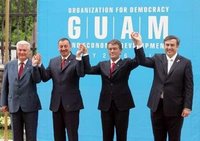 Today, the first more comprehensive analysis of the Russo-Georgian war in August 2008 was published, less than a month after hostilities ended. In its report Det kaukasiska lackmustestet (The Caucasian Test Case), the Swedish Defence Research Agency (FOI) summarises its findings.
Today, the first more comprehensive analysis of the Russo-Georgian war in August 2008 was published, less than a month after hostilities ended. In its report Det kaukasiska lackmustestet (The Caucasian Test Case), the Swedish Defence Research Agency (FOI) summarises its findings.The war between Georgia and Russia in August 2008 has fundamentally changed the playing field of international relations and the aftermath of the war will have profound consequences.My own contribution is a chapter on the information and cyberwar aspects (pp. 45-52).
The purpose of this study is to analyze some central issues and implications of the war. The aim is to, shortly after the war and based on open sources material, draw some tentative conclusions regarding the consequences for the region and the world.
The primary conclusion is that Russia’s actions have triggered a far-reachingreassessment of the present world order. This will in turn lead to extensive policy changes at different levels as the actors adapt and try to influence the formation of the new world order. The war has laid bare the challenges and problems of the present international system. Responses to Russia’s actions will give an early
indication of the character and modus operandi of the coming world order.
Bibliographical information is as follows:
Det kaukasiska lackmustestet: Konsekvenser och lärdomar av det rysk-georgiska kriget i augusti 2008
[The Caucasian Test Case: Consequences and lessons Learned of the Russian-Georgian War in August 2008].
Robert L. Larsson (ed.), Alexander Atarodi, Eva Hagström Frisell, Jakob Hedenskog, Jerker Hellström, Jan Knoph, Vilhelm Konnander, Jan Leijonhielm, David Lindahl, Fredrik Lindvall, Johannes Malminen, Ingmar Oldberg, Fredrik Westerlund, Mike Winnerstig
The report in full [SWE] is available for download or purchase at the FOI website.
Referrals:
"Ryssen valde väg i Georgien. Fel väg!", Svenska Dagbladet, 15 September 2008.
"Analysts Call Russia-Georgia Conflict a 'Litmus Test'", Deutsche Welle, 16 September 2008.
"Analysts Call Russia-Georgia Conflict a 'Litmus Test'", Deutsche Welle, 16 September 2008.
"Ryssland ett växande hot mot sina grannar", Hufvudstadsbladet, 16 september 2008.
"Ny FOI-rapport speglar säkerhetspolitiska läget", Västerbottenskuriren, 17 september 2008.
"Säkerhetspolitiken i Europa är försämrad", Världen idag, 17 september 2008.
"Израилский след - Шведские военспецы выяснили, кто оказывал наибольшую военную помощь Грузии ", Новые Известия, 23 сентября 2008 г.







